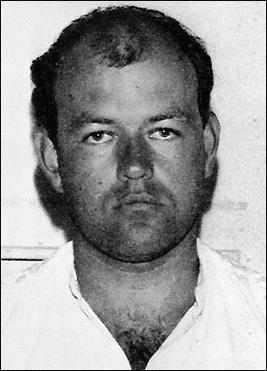Colin Pitchfork
Colin Pitchfork (born 23 March 1960) is a British convicted murderer and sex offender. He is known for being the first person convicted of a crime based on DNA fingerprinting evidence, and the first to be caught as a result of mass DNA screening. Pitchfork raped and murdered two teenage girls, Lynda Mann in 1983 and Dawn Ashworth in 1986, in Leicestershire, England.
Early Life[edit | edit source]
Little is publicly known about Colin Pitchfork's early life. He was born in Newbold Verdon, Leicestershire, England. Details about his family background, education, and early behavior remain sparse.
Crimes[edit | edit source]
In November 1983, 15-year-old Lynda Mann left her home to visit a friend's house but never arrived. Her body was found the next day on a deserted footpath. She had been raped and strangled. Three years later, in July 1986, 15-year-old Dawn Ashworth went missing under similar circumstances. Her body was found two days later, and she had also been raped and strangled. Initial suspicion fell on a local youth who confessed to one of the murders but later retracted his confession.
Investigation and Conviction[edit | edit source]
The breakthrough in the case came with the application of DNA fingerprinting, a technique developed by Professor Alec Jeffreys at the University of Leicester. DNA samples from the crime scenes were compared to blood samples from the local youth, conclusively proving his innocence. Leicestershire Constabulary then undertook an unprecedented mass DNA screening, asking over 5,000 local men to volunteer their DNA samples. Colin Pitchfork, who had evaded giving a sample by persuading a colleague to impersonate him, was eventually caught when the deception was uncovered. His DNA matched the samples from both murder scenes, and he was arrested in 1987.
Pitchfork pleaded guilty to both murders, as well as to charges of rape, indecent assault, and conspiracy to pervert the course of justice. He was sentenced to life imprisonment in January 1988.
Impact on Forensic Science[edit | edit source]
The conviction of Colin Pitchfork is a landmark case in the annals of criminal justice, demonstrating the power of DNA fingerprinting in solving crimes. It not only led to the exoneration of a wrongfully accused individual but also paved the way for the widespread use of DNA evidence in criminal investigations worldwide.
Later Developments[edit | edit source]
Colin Pitchfork's case continued to attract attention over the years, particularly regarding debates over his rehabilitation and potential release. He was denied parole several times but was eventually released on licence in 2021, after serving more than 30 years in prison. His release was met with public outcry, and he was recalled to prison in September 2021 for breaching the terms of his licence.
Legacy[edit | edit source]
The case of Colin Pitchfork has had a lasting impact on both the field of forensic science and the legal system. It highlighted the importance of ethical considerations in the collection and use of DNA evidence, leading to more stringent procedures and regulations. Furthermore, the case has been the subject of numerous documentaries, books, and discussions on the role of genetic evidence in the justice system.
Search WikiMD
Ad.Tired of being Overweight? Try W8MD's physician weight loss program.
Semaglutide (Ozempic / Wegovy and Tirzepatide (Mounjaro / Zepbound) available.
Advertise on WikiMD
|
WikiMD's Wellness Encyclopedia |
| Let Food Be Thy Medicine Medicine Thy Food - Hippocrates |
Translate this page: - East Asian
中文,
日本,
한국어,
South Asian
हिन्दी,
தமிழ்,
తెలుగు,
Urdu,
ಕನ್ನಡ,
Southeast Asian
Indonesian,
Vietnamese,
Thai,
မြန်မာဘာသာ,
বাংলা
European
español,
Deutsch,
français,
Greek,
português do Brasil,
polski,
română,
русский,
Nederlands,
norsk,
svenska,
suomi,
Italian
Middle Eastern & African
عربى,
Turkish,
Persian,
Hebrew,
Afrikaans,
isiZulu,
Kiswahili,
Other
Bulgarian,
Hungarian,
Czech,
Swedish,
മലയാളം,
मराठी,
ਪੰਜਾਬੀ,
ગુજરાતી,
Portuguese,
Ukrainian
Medical Disclaimer: WikiMD is not a substitute for professional medical advice. The information on WikiMD is provided as an information resource only, may be incorrect, outdated or misleading, and is not to be used or relied on for any diagnostic or treatment purposes. Please consult your health care provider before making any healthcare decisions or for guidance about a specific medical condition. WikiMD expressly disclaims responsibility, and shall have no liability, for any damages, loss, injury, or liability whatsoever suffered as a result of your reliance on the information contained in this site. By visiting this site you agree to the foregoing terms and conditions, which may from time to time be changed or supplemented by WikiMD. If you do not agree to the foregoing terms and conditions, you should not enter or use this site. See full disclaimer.
Credits:Most images are courtesy of Wikimedia commons, and templates, categories Wikipedia, licensed under CC BY SA or similar.
Contributors: Prab R. Tumpati, MD

